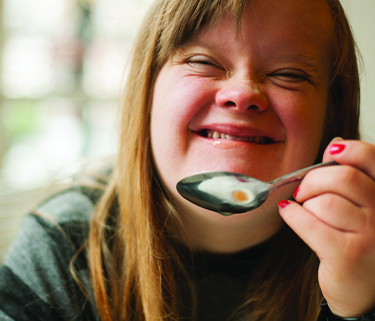A Father’s Love: The Rewards of Disability
 Jose Velasco is thankful for the incredible journey of fatherhood. The father of two did not foresee the life he and his wife, Deya, and their son and daughter created, together. This Father’s Day, Jose reflects on nearly three decades of being a dad and how disability has rewarded his life in ways he had not imagined when the family began their autism journey. Each day of that journey, Jose has only wanted one thing.
Jose Velasco is thankful for the incredible journey of fatherhood. The father of two did not foresee the life he and his wife, Deya, and their son and daughter created, together. This Father’s Day, Jose reflects on nearly three decades of being a dad and how disability has rewarded his life in ways he had not imagined when the family began their autism journey. Each day of that journey, Jose has only wanted one thing.
“The single biggest thing we want is for our kids to be happy,” he said. “Seeing the resilience my son has demonstrated has been absolutely phenomenal. I’ve learned so much about kindness.”
Jose’s 27-year-old son is named in his father’s honor. Jose, Jr. is on the autism spectrum, a diagnosis that has presented challenges along the way, while instilling determination and a growing realization that disability does not minimize ability.
When asked to describe his best memories with his father, it is clear there are just too many. Jose, Sr. has always been there for his son.
“Where to begin … I think it goes all the way since I was born,” Jose, Jr. told The Arc. “He is the equivalent of my best life-long friend. We have done great things together, from flying on a biplane, to riding numerous trains (steam, diesel, old and new) to high-adventures in the Rocky Mountains, like hiking and white water rafting. Spending a lot of time together has been one of my favorites things, including various journeys around the U.S. and Mexico.”
Jose, Sr. is a member of The Arc of the United States Board of Directors. He is program director in the Business Process Intelligence organization of global software company SAP. He is also ambassador of the company’s Autism at Work program, which has provided more than 600 employment opportunities for people on the spectrum. But Jose is most proud of his title as dad.

“Seeing Jose, Jr. succeed, happy, and how he has inspired people,” he said describing the greatest rewards of being Jose’s father.
This spring, Jose, Jr. accomplished a major achievement. After several years of setting goals, persisting, and working hard, he graduated from Austin Community College earning an Associate of Applied Science degree in Computer Information Technology – Computer Programming – Software Testing Specialization.
“He worked so hard for that. He worked really, really hard,” said Jose, Sr. “It was a reward for my wife and me, but for him as well.”
“The equivalent of winning a race. It was two-year degree, it took me close to 7 years and it felt great to have finished something I started,” Jose, Jr. said with pride.
Jose, Sr. is a disability rights advocate not only for his son, but – for all. He joins The Arc and other advocates who are urgently calling on Congress to act to fund $400 billion for the Medicaid home and community-based service (HCBS) system, increase wages for the direct care workforce, and create more of these jobs.
For years, the service system that people with intellectual and developments disabilities and their families rely on, Medicaid, has needed an update. People are stuck on waiting lists, the direct care workforce is underpaid, and too often, unpaid family caregivers are filling in the gaps in service. The COVID-19 pandemic has magnified these problems and exposed the cracks and gaps in the care infrastructure when it comes to supporting people with disabilities.
Jose, Sr. is hopeful this investment by Congress would help secure a life of opportunity and independence for his son in the future and the disability community as a whole.
“There are very high hopes from our IDD community for the HCBS investment to take place. Expanding access to services, the creation of direct care jobs, and an increase in wages are cornerstone elements of a sustainable platform to deliver quality services that so many people need.”
Being a father to a child with a disability has taught Jose many life lessons.
In high school, Jose, Jr. went out for the wrestling team. He fell in love with the sport but the skills didn’t come naturally. After several early elimination losses, Jose, Sr. and his wife felt heartbroken for their son and lovingly suggested that he help support the team as a student assistant. But, Jose, Jr. – determined – taught his parents a valuable lesson.
“He said ‘you guys don’t get it. I want to be a wrestler,’” Jose, Sr. explained.
Jose, Jr. started training and working out and it paid off.
“He won. The gym went crazy. It was the beginning for him of something special,” Jose, Sr. shared holding back tears.
It was in that moment Jose, Jr. decided he wanted to go to college.
Today, Jose, Jr. works for the Internal Revenue Service. He started a new position earlier this year and has risen to the challenges of the new role.
This Father’s Day, Jose, Jr. has this message for his dad:
“This is what I would put in a card for Father’s Day: Dad, all I want to say is thank you. Thank you for being my father, for raising me, teaching me, and protecting me.”
Like father, like son. Jose, Sr. is also thankful. The rewards of disability and fatherhood are immeasurable.



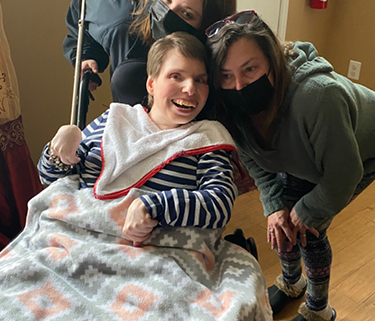
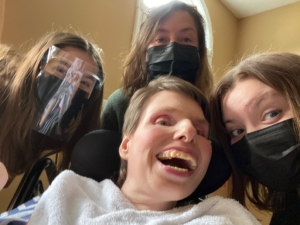
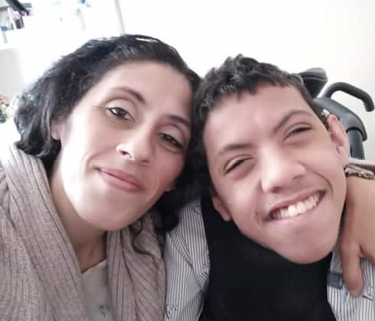
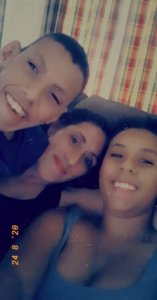 l love and infinite strength of mothers. We recognize the mother figures and grandmothers who nurture and support us – no matter what. We embrace the challenges of motherhood. We revel in the joys.
l love and infinite strength of mothers. We recognize the mother figures and grandmothers who nurture and support us – no matter what. We embrace the challenges of motherhood. We revel in the joys.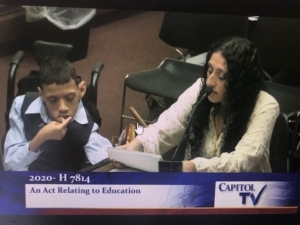 n as a mother extends into advocacy. Working with The Arc Rhode Island, she advocated in the General Assembly in support of special education reform to give parents and guardians more rights in the Individualized Education Program, or IEP, process. In testimony before the Rhode Island House of Representatives, Kendra and Joshua shared challenges with the IEP process for families and why is critical that students with disabilities receive a Free Appropriate Public Education, or FAPE, as mandated by federal and state law. Kendra is also part of a group of parents, guardians, and educators in Rhode Island advocating for the creation of an independent special education ombudsman office to investigate special education disputes and serve as a resource for parents and guardians. The office would also provide an outlet for anonymous reports of possible violations.
n as a mother extends into advocacy. Working with The Arc Rhode Island, she advocated in the General Assembly in support of special education reform to give parents and guardians more rights in the Individualized Education Program, or IEP, process. In testimony before the Rhode Island House of Representatives, Kendra and Joshua shared challenges with the IEP process for families and why is critical that students with disabilities receive a Free Appropriate Public Education, or FAPE, as mandated by federal and state law. Kendra is also part of a group of parents, guardians, and educators in Rhode Island advocating for the creation of an independent special education ombudsman office to investigate special education disputes and serve as a resource for parents and guardians. The office would also provide an outlet for anonymous reports of possible violations.
 Steve has cerebal palsy. For most of his young life, and like many people with disabilities, he lived with his mom. When Steve was only 22 years old, his mom became very ill. Because she could no longer provide the supports he needed, Steve was forced to move into a nursing home to get the care he could no longer receive in his childhood home. Even though Steve knew he could make it in the community with the right supports, he was forced to make this move. This was because his family was concerned about his well-being if he lived independently, and because they feared the appropriate supports were not available to him.
Steve has cerebal palsy. For most of his young life, and like many people with disabilities, he lived with his mom. When Steve was only 22 years old, his mom became very ill. Because she could no longer provide the supports he needed, Steve was forced to move into a nursing home to get the care he could no longer receive in his childhood home. Even though Steve knew he could make it in the community with the right supports, he was forced to make this move. This was because his family was concerned about his well-being if he lived independently, and because they feared the appropriate supports were not available to him. There were no supports available outside of the public schools and the schools were not prepared to serve children with high levels of need. When my brother was kicked out of school at a very young age (before the federal law ensuring a right to education) for his disability-related behaviors, he had nowhere to go except home all day with a very loving caregiver. He missed the routines and rhythms of school and had a hard time staying home while everyone else went to work or school daily. He waited all day for the staggered returns of kids and parents, dinner, and then his beloved ride to the drugstore for a Coke and a long drive listening to rock and roll and beach music on the radio. Jud also had daily trips to the Post Office with our Dad to pick up the mail for his business, trips to the barbershop, church on Sundays, other local gathering places, and a house full of our friends and exchange students who lived with us at various times. He loved all the interaction and was known all over town.
There were no supports available outside of the public schools and the schools were not prepared to serve children with high levels of need. When my brother was kicked out of school at a very young age (before the federal law ensuring a right to education) for his disability-related behaviors, he had nowhere to go except home all day with a very loving caregiver. He missed the routines and rhythms of school and had a hard time staying home while everyone else went to work or school daily. He waited all day for the staggered returns of kids and parents, dinner, and then his beloved ride to the drugstore for a Coke and a long drive listening to rock and roll and beach music on the radio. Jud also had daily trips to the Post Office with our Dad to pick up the mail for his business, trips to the barbershop, church on Sundays, other local gathering places, and a house full of our friends and exchange students who lived with us at various times. He loved all the interaction and was known all over town. Sadly, as each of his older siblings began to leave home for college, military service, or otherwise, Jud’s physical size and his inability to control his frustrations and emotions became dangerous for our aging parents. After much searching and trying many approaches, the only available service for someone with his needs was the state institutional system. This was devastating for Jud, for our whole family, and for the many friends who had known him over the years. Jud suffered greatly from the travel distance from his family (even though we visited regularly), home and hometown, friends, and routines. And while there were some wonderful staff who supported him in his new location, we were horrified to learn that he also suffered some terrible abuses– the kinds of things that can be hidden when people who are unable to communicate or be understood cannot tell others what is happening to them. My father found that Jud had been burned with cigarettes and that other men in his unit had been more extensively burned. In other incidents, men in his unit died after being subjected to dangerous restraint methods. He also suffered from toxic environmental conditions, including asbestos and sewage leakage. As a family, we were determined to end these abuses.
Sadly, as each of his older siblings began to leave home for college, military service, or otherwise, Jud’s physical size and his inability to control his frustrations and emotions became dangerous for our aging parents. After much searching and trying many approaches, the only available service for someone with his needs was the state institutional system. This was devastating for Jud, for our whole family, and for the many friends who had known him over the years. Jud suffered greatly from the travel distance from his family (even though we visited regularly), home and hometown, friends, and routines. And while there were some wonderful staff who supported him in his new location, we were horrified to learn that he also suffered some terrible abuses– the kinds of things that can be hidden when people who are unable to communicate or be understood cannot tell others what is happening to them. My father found that Jud had been burned with cigarettes and that other men in his unit had been more extensively burned. In other incidents, men in his unit died after being subjected to dangerous restraint methods. He also suffered from toxic environmental conditions, including asbestos and sewage leakage. As a family, we were determined to end these abuses. Jud’s experiences fueled my passion to change the system. I worked in Washington to pass federal legislation to move the Medicaid funding bias away from institutions and to build the community service system, making the community the preferred service setting. My advocacy led me to a career in The Arc’s national public policy office, which I joined in 1984. While our systems have evolved since the 70s through the late 80s when my brother was experiencing so much pain, we still have a long way to go. I am happy to report that Jud was eventually able to leave the state institution and live in a group home about 7 minutes from our widowed mother in his beloved hometown for the last 20+ years of his life. Jud also experienced some serious problems in his group home, but those were able to be discovered and remedied because family were nearby and able to observe how he was doing. For those who understood him, Jud continued his mantra: “Stay at the new house; not gonna keep saying it” throughout those years, lest anyone think he would ever want to go back to the institution.
Jud’s experiences fueled my passion to change the system. I worked in Washington to pass federal legislation to move the Medicaid funding bias away from institutions and to build the community service system, making the community the preferred service setting. My advocacy led me to a career in The Arc’s national public policy office, which I joined in 1984. While our systems have evolved since the 70s through the late 80s when my brother was experiencing so much pain, we still have a long way to go. I am happy to report that Jud was eventually able to leave the state institution and live in a group home about 7 minutes from our widowed mother in his beloved hometown for the last 20+ years of his life. Jud also experienced some serious problems in his group home, but those were able to be discovered and remedied because family were nearby and able to observe how he was doing. For those who understood him, Jud continued his mantra: “Stay at the new house; not gonna keep saying it” throughout those years, lest anyone think he would ever want to go back to the institution.